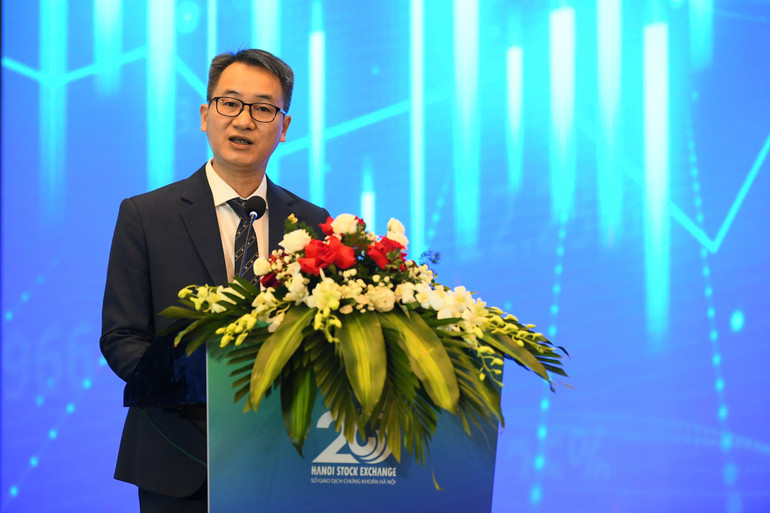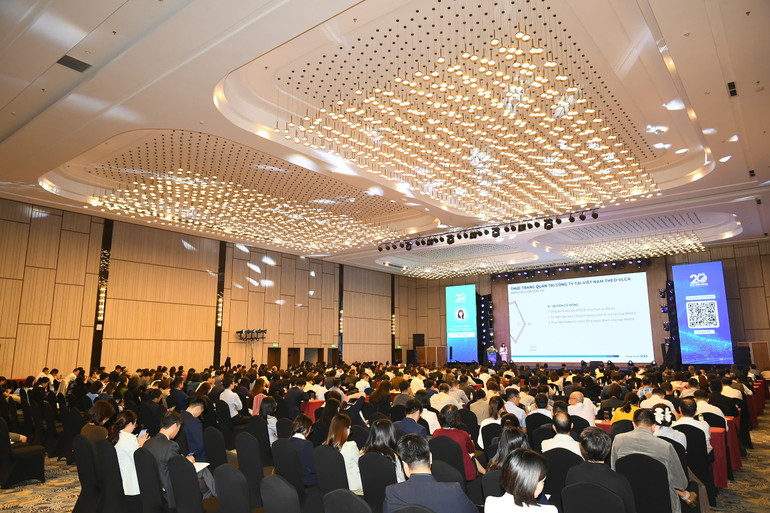On the morning of November 7, the Hanoi Stock Exchange (HNX) organized a workshop on Corporate Governance and the path to sustainable development for enterprises. The workshop was attended by leaders of a number of functional units of the State Securities Commission, representatives of the Vietnam Securities Depository and Clearing Corporation (VSDC), leaders of the Vietnam Stock Exchange, Hanoi Stock Exchange, Ho Chi Minh City Stock Exchange, experts on corporate governance, and representatives of enterprises in the stock market.
Corporate governance is a strategic fulcrum
Speaking at the workshop, Mr. Do Van Tam - Deputy General Director of Hanoi Stock Exchange (HNX) said that in a rapidly changing and unpredictable world like today, the strength of an enterprise does not only come from capital size or market share, but also from the governance foundation - where the vision, operational discipline and development culture of the organization are formed.

Corporate governance is the strategic fulcrum that helps businesses maintain stability, control risks and build trust. A good governance system not only helps businesses overcome challenges, but also opens the path to long-term, responsible and sustainable growth.
In the context of increasingly clear requirements on environment, social responsibility and information transparency, businesses cannot develop with short-term thinking.
“Only when governance is based on core values, international standards and integrity in action, can we build true competitiveness and affirm our position in the market. Good corporate governance is not just a requirement - it is the internal strength that determines the future of the enterprise” - HNX leaders said.
According to Mr. Do Van Tam, the world is witnessing a profound transformation, from a governance model that only focuses on shareholder benefits to an ESG (Environment, Society and Governance)-oriented governance model - where businesses develop not only for growth, but also to spread sustainable values.
In 2023, the Organisation for Economic Co-operation and Development (OECD) and the G20 Group issued the G20/OECD 2023 Corporate Governance Principles, which for the first time added a dedicated chapter on Sustainability and Resilience. The OECD asserted: “An effective corporate governance framework not only protects investors, but also strengthens the stability and sustainability of the economy as a whole.”
In Asia, 2025 is forecast to be a time of strong transition from “compliance”-based governance to governance oriented towards long-term value creation. Businesses need not only to do the right thing, but also to do it well - persistently, strategically, consistently.
Need to proactively join hands
Over the years, listed companies in particular and public companies in general have increasingly increased their compliance and access to good practices in corporate governance around the world. The capital market plays an important role in the process of shifting the Vietnamese economy towards low carbon and improving its resilience to climate change, through efforts to mobilize green capital. Therefore, to achieve new progress, it is necessary to have the proactive participation and joint actions of the business community, investors and management agencies.
“When awareness changes, actions will change; and when businesses change, the market will change. A transparent, efficient and sustainable market is not formed by an individual or an organization, but by the cooperation of all of us,” said Mr. Do Van Tam.

According to information from HNX, along with the Company Charter, enterprises need to apply internal regulations for many different purposes. Public companies must issue corporate governance regulations and are encouraged to apply the Corporate Governance Principles according to Vietnam's best practices to ensure the company is operated and controlled effectively. These regulations need to be issued consistently with the Company Charter. Currently, more than 90% of enterprises on HNX have issued internal regulations on corporate governance according to regulations.
Joint stock companies are recommended to hold their annual general meeting of shareholders within 4 months from the end of the fiscal year. About 69% of listed companies and 52% of UPCoM companies have applied this good practice. The number of enterprises holding meetings after the first 6 months of the fiscal year or not holding the 2025 annual general meeting of shareholders is still high in UPCoM (nearly 17% of enterprises), and in the listed market, it accounts for about 7%.
In addition to ensuring shareholders' rights at the Annual General Meeting of Shareholders, companies must inform the market about all matters related to the company's operations.

According to information from HNX, Circular No. 96/2020/TT-BTC stipulates that all public companies must disclose audited annual financial statements within 10 days from the date the auditing organization signs the audit report but not exceeding 90 days from the end of the fiscal year. However, nearly 4% of listed organizations and 14% of registered trading organizations still violate the regulation by delaying or not yet disclosing financial statements for 2024.
In addition, listed companies and large-scale public companies must disclose information on quarterly financial reports and reviewed semi-annual financial reports according to Circular No. 96. More than 5% of listed companies and more than 15% of large-scale public companies on UPCoM still violate the regulations. In addition, more than 5% of companies have not yet disclosed information and explanations related to financial reports according to regulations.
Good corporate governance cannot be achieved without the effective functioning of the board of directors, supervisory board or audit committee.
The Board of Directors is an agency elected or dismissed by shareholders, and is entrusted by shareholders to manage the company. To ensure the effective operation of the Board of Directors, the number of members of the Board of Directors must be from 3 to 11 members. However, nearly 6% of companies on UPCoM still do not comply with this regulation.
As the business environment continues to become more complex, the demands and responsibilities on the Board of Directors are increasing. To overcome these challenges, the Board of Directors may choose to establish specialized committees within the Board of Directors to assist in performing its functions and avoid conflicts of interest. The Board of Directors is encouraged to establish an Audit Committee (also known as an audit subcommittee), however, less than 10% of companies on the HNX have established an audit subcommittee within the Board of Directors.
In addition to the board of directors, a joint stock company also has a board of supervisors or an audit committee under the board of directors according to two models in the Enterprise Law.
Shareholders also exercise the right to elect and dismiss the Board of Supervisors. The Board of Supervisors exercises control over the company's operations and finances. The main function of the Board of Supervisors is to supervise the Board of Directors and the General Director in managing and operating the company. The Board of Supervisors of a joint stock company has from 3 to 5 supervisors. Over 87% of the number of enterprises on the HNX have implemented this regulation; only about 30% of companies have a head of the Board of Supervisors working full-time at the company.
At the workshop, Mr. Le Trung Hai - Deputy Head of the Public Company Supervision Board, State Securities Commission also introduced the new regulations on corporate governance in Law No. 56/2024/QH15 and Decree No. 245/2025/ND-CP to business representatives.
At the same time, the workshop also listened to presentations from Ms. Nguyen Thu Hien - Head of Finance Department, Faculty of Industrial Management - Ho Chi Minh City University of Technology (IFC speaker) with the topic "Corporate governance trends in Asia in 2025"; and Mr. Nguyen Cong Minh Bao - Country Director - Global Reporting Initiative in Vietnam (GRI) with the topic "Updating the connection trend between corporate governance and ESG, Vietnamese enterprises prepare for sustainability reporting requirements".
Also at the workshop, the organizing committee took time for representatives of management agencies, related units, and speakers to discuss with businesses. Important issues or those requiring more specific information from businesses were also thoroughly and specifically answered.
Source: https://nhandan.vn/quan-tri-cong-ty-tot-la-suc-manh-noi-luc-quyet-dinh-tuong-lai-cua-doanh-nghiep-post921419.html







![[Photo] Da Nang: Hundreds of people join hands to clean up a vital tourist route after storm No. 13](https://vphoto.vietnam.vn/thumb/1200x675/vietnam/resource/IMAGE/2025/11/07/1762491638903_image-3-1353-jpg.webp)
































































































Comment (0)